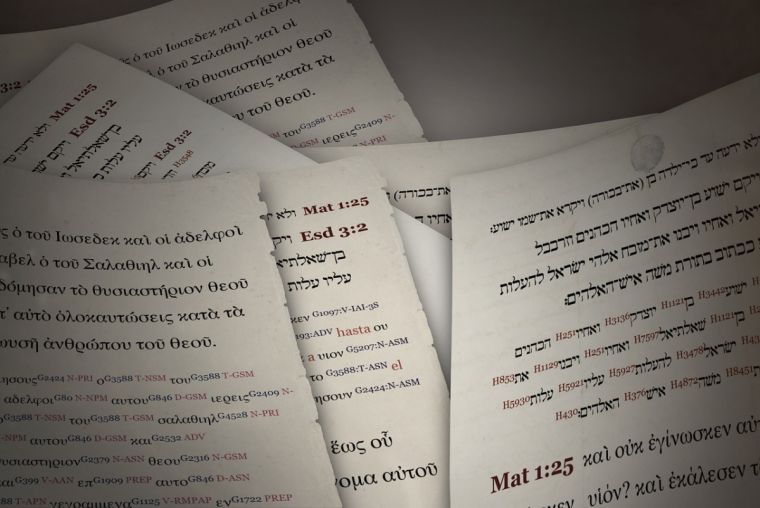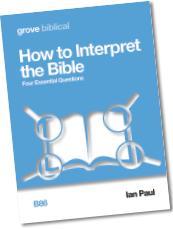How to explain the Bible without explaining it away
At church one Sunday recently I fell into conversation about a TV programme on biblical archaeology. The man I was talking to objected to the presenter's tone, which was sceptical. My friend has a deep but straightforward faith. 'God is God,' he said. 'It doesn't have to make sense to us, we just have to believe it.'
That's the issue in a nutshell for many Christians today. Explaining difficult passages sounds like explaining them away. At its worst, it makes the biblical writers out to be idiots. My A-level RE teacher, for instance – an ordained minister – assured us that Jesus walked not on the water, but on a sandbar projecting from the shore; it was all a trick of the evening light. And as for the feeding of the 5,000: lots of them had brought their own food with them – so, children, this was really a miracle of sharing.

When they're offered such tripe, no wonder so many Christians are reluctant to engage with the principles of biblical interpretation at all. There's something dodgy about the whole enterprise – surely the Bible just means what it says?
Ian Paul's How to Interpret the Bible: Four essential questions is designed to address this quite fundamental question. It's another title in the excellent Grove Booklets series, which combines scholarly expertise with that precious gift of brevity. These are short booklets but full of good things, and Ian Paul's is no exception.
Interpretation, he says, is in fact impossible to avoid, partly because of the nature of the Bible and partly because of the nature of Christian faith. And the Bible is translated – not just from ancient languages, but between people as well. But this interpretation should never just be the preserve of 'experts' – it 'needs to be done by the whole people of God'.
His four 'essential questions' are not such that any serious student of the Bible would quarrel with. They are, What kind of writing? (reading for genre), What did it mean? (reading in context), What does it say? (attending to content), and What part of the story? (reading the canon).
The first question shouldn't be controversial, but it often is. It's obvious, he says, that Genesis 1 isn't a science textbook – but all too many Christians assume it is and are pinned to a literalist account of creation. And how do you read apocalyptic books? In Revelation, John 'has a message to help them live in their first-century context rather than offering an "end-times timetable" for the distant future' – but again, without a clear understanding of genre, this is exactly what a lot of conservative Christians have ended up with.
A warning to the reader cautions against a 'pick and mix' approach, writing off as 'symbolic' anything that's challenging. Here there's more room for debate than he grants in such a short book over what stories presented as historical were actually intended to be read that way, but the point still stands: we don't use 'genre' to avoid difficulties.
His section on 'reading in context', which stresses the importance of background historical and linguistic knowledge, has really interesting reflections on the lukewarm Laodicians, the parable of the talents and – particularly important given the inroads the pseudo-theological 'complementarian' movement appears to be making into sections of British Christianity – 'headship' in 1 Corinthinians 11 ('head' didn't refer to authority or control, as it tends to now).
This theme recurs in the section on 'attending to content' ('What does it say?'), which stresses the importance of really close attention to the text, using all the tools available. In terms of gender relations, he instances 1 Timothy 2, where Paul says women should 'learn in silence' and 'be quiet'. But what does 'silence' mean? Not 'absolute silence' – there's another word for that – but in the sense of not being argumentative. Back to 1 Corinthians 11, and the head covering 'as a sign of authority' in verse 10 – which actually, he says, means the reverse of what's sometimes assumed: 'In other words, says Paul, if you Corinthians insist on women having a covering, fine – God has already provided one in the form of naturally long hair. So women can indeed pray and prophesy in their own right – and exercise all the other gifts of the Spirit which the Spirit gives to whoever he chooses!' He has helpful suggestions about how to develop our attention to the text – read more slowly, put it in our own words – even, he suggests, learn the language for ourselves.
In his section on 'reading the canon' ('What part of the story?') he stresses the need to fit a passage or text into the bigger picture (and amen to his remarks on projecting a reading on to the screen – you can't see what's around it). Again, there's sensible pastoral advice about how to do this, not just why you should.

To return to where we started: there's unquestionably, in some parts of the church – and particularly among conservative evangelicals – a deep suspicion of scholarship. Different sections of the evangelical community have their red lines, and transgressing them is regarded as a moral failing rather than as scholarly inquiry. Ian Paul's little book shows convincingly how the interpretation of the Bible is an enterprise for the whole Christian community, not just for the 'expert' gatekeepers – but also how the knowledge and experience they bring is a gift to the church that needs to be treasured and used.
There's nothing threatening about Bible study, except in sense expressed by Mark Twain: 'It ain't those parts of the Bible that I can't understand that bother me, it is the parts that I do understand.'
How to Interpret the Bible is available from Grove Booklets, price £3.95.











